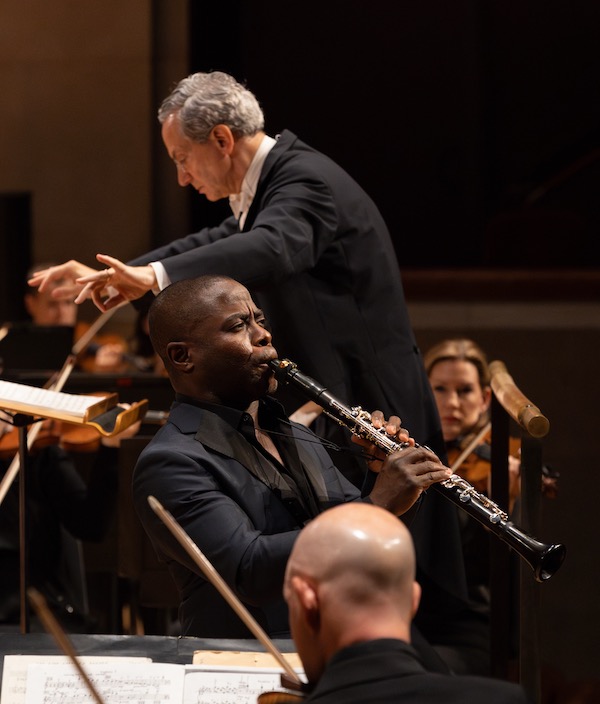Schuman and Liszt rarities frame a charismatic clarinetist in DSO opener

The Dallas Symphony Orchestra opened its classical season Thursday night with a program that featured mostly rare gems.
The outlier was the opening item, William Schuman’s American Festival Overture, which hasn’t been performed by the DSO since 1994. The work features some tricky string writing, including a fugue that begins in the violas and continues with the second violins, then is picked up by the entire orchestra. The violas, with key personnel additions over recent seasons, sounded absolutely terrific, and the second violins seem finally to have adjusted to their placement on the edge of the stage. The frenzied mood of most of the piece and the sheer volume of the ending made for an exciting start to the season.
The headliner on this program is Anthony McGill, the New York Philharmonic’s principal clarinet,, playing the Copland Concerto for Clarinet and Orchestra. McGill’s brother Demarre McGill was principal flute in Dallas for several years before taking the same position in Seattle, so the family name is a familiar one.
Anthony McGill’s performance of the Copland was an absolute triumph Thursday evening. The first movement, marked “Slowly and expressively,” was a showpiece for McGill’s sinuous, weaving, long lines. His extraordinary phrasing created an ecstatic atmosphere, unbroken in the cadenza that links the first movement to the second and final one, marked “Rather fast.”
The cadenza and the final movement were vehicles for McGill’s more virtuosic playing—this is a clarinetist who seems to be able to make his instrument do whatever he wishes, at any place in the register, with any tone, and improbably long lines. McGill has an appealingly flamboyant stage presence, too, without being excessively distracting—one almost imagines the clarinet as his dance partner, swooping and dipping across the stage.
After intermission, the DSO took on the local premiere of Liszt’s A Faust Symphony, almost 170 years after it was composed. This is a seldom-heard orchestral piece is, of course, based on Goethe’s Faust, with each movement named after the three main characters: Faust, Gretchen, and Mephistopheles.
Like much of Liszt’s music, the rarely performed symphony is a flashy showpiece, scored for large orchestra, tenor soloist, men’s chorus, and organ, although the final three components wait for well over an hour to get their moment. Ultimately, it’s not just the large number of personnel that accounts for the rare performances of this piece; it’s also that the symphony sprawls like a coonhound in a patch of sun— languid and for long stretches nearly motionless.
The Faust Symphony does have some moments of poetry, which the DSO pulled off brilliantly. The reiterative viola solo in the first movement, which represents Faust, was elegantly played by principal Meredith Kufchak. But, as with a lot of Liszt, there are simply “too many notes.” The wandering scales in the strings, the interminable trumpet fanfares all take too long to get to the point.
In the middle Gretchen movement, Gretchen’s themebloomed in an extended, gorgeous duet by violist Kufchak and principal oboe Erin Hannigan. In the Mephistopheles finale, we finally hear the patiently waiting chorus, prepared brilliantly by director Anthony Blake Clark as well as Carl Tanner’s imposing voice. Stationed in the choral terrace, the tenor seemed to be forcing his voice to be heard over the orchestra. Bradley Welch, who has also waited for his few minutes, makes the Meyerson’s organ sound even more fabulous than it already is.
This is a piece that concertgoers are lucky to have heard, and may not have the chance to hear again—Fabio Luisi seems to be intent on presenting us with plenty of less familiar repertoire alongside the warhorses that power ticket sales. And with the orchestra at the top of their game, Luisi brought polish and finesse to all seventy minutes of Liszt’s symphony.
The program will be repeated 3 p.m. Sunday. Dallasymphony.org